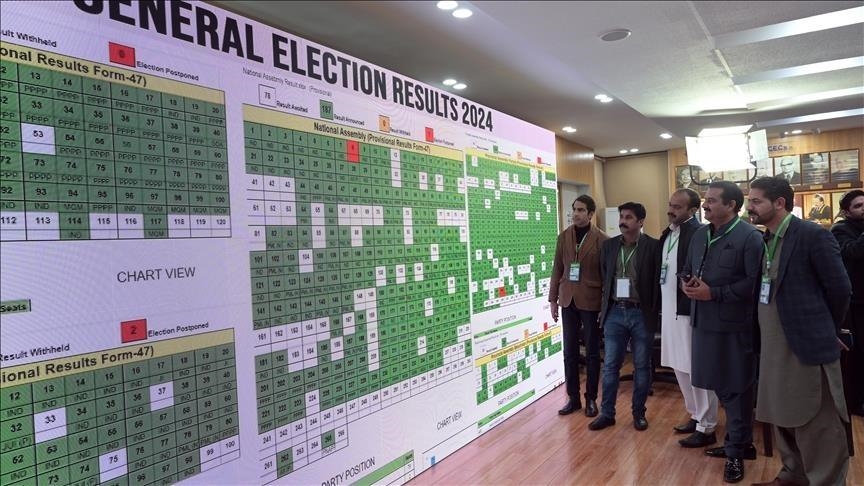KARACHI, Pakistan
Pakistan’s three mainstream political parties are still struggling to finalize talks to form a minority government following the high-stake Feb. 8 general elections.
Although a coalition led by the Pakistan Muslim League-Nawaz (PML-N) has higher chances of forming a new government for a five-year term after amassing the support of newly-elected lawmakers it required for a simple majority in the lower house of parliament, or National Assembly, the picture of the new set up is still unclear.
The coalition — comprising three-time Prime Minister Nawaz Sharif’s PML(N), Pakistan Peoples of former Foreign Minister Bilawal Bhutto Zardari, and several regional parties — has already named ex-Prime Minister Shehbaz Sharif as its candidate for the coveted post for a second term.
The PPP has announced to support the junior Sharif for the post of prime minister, but refused to join his Cabinet, a move the PML(N) does not agree with.
Bilawal, during a public rally in the southern Sindh province on Sunday, reiterated his party’s position, saying the PPP lawmakers would not join the Cabinet.
Both parties are yet to agree on final points,” said Senator Ishaq Dar, a PML (N) leader who is leading in the talks, in a statement on Sunday posted on X.
“Negotiations are underway on various proposals” for power sharing, he added.
The crucial Feb. 8 elections, marred by violence and rigging charges, have resulted in a hung parliament, with no party securing two-thirds of the seats to form the government with a simple majority, triggering an intense race to stitch coalitions.
According to the latest tally announced by the Election Commission of Pakistan, the PML-N-led coalition has a combined strength of over 150 out of 266 directly contested seats of the National Assembly.
Jailed ex-Premier Khan’s party vows to form gov’t
To form a government with a simple majority, a party requires 134 direct seats, which can be counted as 169 MPs after allocating members to reserved seats for women and religious minorities in the National Assembly.
The PML-N, PPP, and MQM got 75, 54, and 17 seats, respectively, in last week’s elections. Six independent lawmakers have also joined the PML-N, increasing its strength to 81.
Although independent candidates backed by Imran Khan’s Pakistan Tehreek-e-Insaf (PTI) won 93 seats, the highest number of MPs, the party could not form a coalition with other parties to reach a simple majority.
The National Assembly has 336 seats, 60 reserved for women and 10 for religious minorities.
These are proportionately distributed among parties based on their electoral performance. Any party that wants its leader to become the prime minister will need 169 votes in the House.
The PTI on Monday announced that its affiliated independent candidates will merge into the Sunni Ittehad Council, a small religiopolitical party, in the National and provincial assemblies.
Addressing a news conference in Islamabad on Monday, Gohar Khan, who is heading the party in Khan’s absence, told Anadolu that the move is aimed at securing a share of the reserved seats in the National, Punjab, and Khyber Pakhtunkhwa (KP) assemblies “as per law.”
However, it is still unclear if the Sunni Ittehad Council had submitted a list for reserved seats before the elections. According to the rules, a party has to submit a priority list for reserved seats to the election commission within a stipulated time period before the polling.
The PTI-backed candidates, however, are in a comfortable position to form the government in KP even if it does not get a share of reserved seats.

